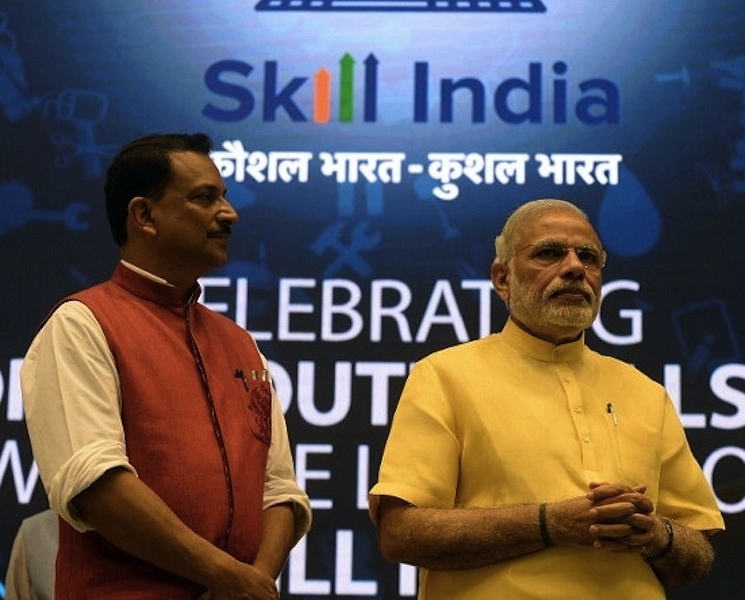Economy
A Right To Skill Development Is Just So Wrong

No one was expecting the National Democratic Alliance (NDA) to roll back the National Rural Employment Guarantee Act (NREGA), the Right to Free and Compulsory Education (Right to Education or RTE) Act or the National Food Security Act (NFSA). After all, the BJP had quite actively supported the passage of these Acts and had even crowed about the fact that a BJP-ruled state, Chhattisgarh, had pioneered a food security legislation.
But no one was also expecting that more such rights would be enacted. Turned out the expectation was wrong. Going by this report in the Hindustan Times, the NDA-II government is planning to enact a right to skill development. This is not a news report based on anonymous sources (such stories can turn out to be wrong sometimes) but is quoting the minister of state for skill development, Rajiv Pratap Rudy. The inspiration behind this? Chhattisgarh once again – it enacted a Right of Youth to Skill Development Act, 2013.
The Chattisgarh right to skill development law says no one between the ages of 14 and 45 can be denied access to skill development opportunities. It requires the government to ensure that a person applying for skill development gets admitted into a course within 90 days. Reports say the state government has hugely ramped up the number of ITIs and polytechnics since the Act was passed. But many people in the rural areas – precisely those people who need skill development in order to move out of agriculture – are not aware of this law. Nor are they in a position to take on the government if it fails to provide them admission to a course?
Problems relating to the enforcement of right-based entitlement laws are often glossed over. A telling example is that of the NFSA, which is nowhere close to a national rollout even two years after it was passed and even Congress-ruled state governments are dragging their feet on this. The provisions in the RTE requiring private schools to reserve 25 per cent seats for children from poor families has resulted in a huge admission scam in Delhi.
Rudy says the proposal is at a discussion stage, but why is a government headed by someone who keeps chanting the mantra of minimum government even thinking of such a right? Skill development is not a public good that requires it to be provided by the state. It certainly helps industry and is vital to address the unemployment problem, but that still does not make it a public good.
Yes, there is a huge skills gap in the country and that is affecting the competitiveness of Indian manufacturing. The website of the ministry of skill development and entrepreneurship says only 5 per cent of those in the 20-24 age group have formal vocational skills against between 60 per cent and 90 per cent in developed countries. The National Strategy for Manufacturing put out by the erstwhile National Manufacturing Competitiveness Council (NMCC) said that 1.5 million technically skilled people will have to come into the work force every year for the manufacturing sector to grow at 12 per cent a year. We are nowhere close to that. Though there has been an increase in the training infrastructure – the number of Industrial Training Institutes (ITIs) has more than doubled between 2004 and 2014 – this still falls short of what is needed.
Yes, the vocational education and apprenticeship programmes in the country are abysmal. The syllabus and curriculum of ITIs as well as the polytechnics lag behind industry requirements. That is the reason why many educated youth are unemployable. The institutes lack operational freedom to address this lacuna. Attempts to get the private sector to adopt ITIs have not met with much success because of this problem. Industry has been extremely frustrated by the inflexibility it comes up against whenever experiments have been attempted.
But merely legislating a legally-enforceable right without breaking the bureaucratic stranglehold on these institutions will not help address the skill deficit. And removing the structural flaws does not require a right to be legislated – it requires political will.
Rights-based legislation is not the panacea for all governance-related problems. All that they will do is create another layer of bureaucracy. It will be far better for the government to identify hurdles to private initiative in this area and remove them, instead of taking on another onerous responsibility which it is not equipped to shoulder and indeed should not shoulder.
Introducing ElectionsHQ + 50 Ground Reports Project
The 2024 elections might seem easy to guess, but there are some important questions that shouldn't be missed.
Do freebies still sway voters? Do people prioritise infrastructure when voting? How will Punjab vote?
The answers to these questions provide great insights into where we, as a country, are headed in the years to come.
Swarajya is starting a project with an aim to do 50 solid ground stories and a smart commentary service on WhatsApp, a one-of-a-kind. We'd love your support during this election season.
Click below to contribute.
Latest